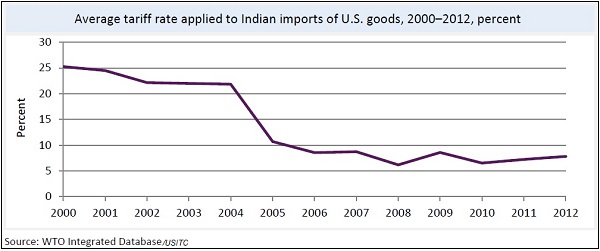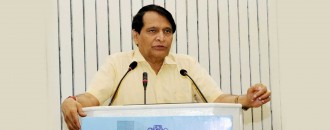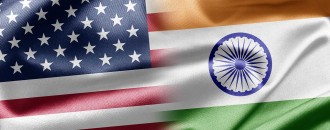
India’s policy barriers hurting imports from USA: USITC
 According to USITC, the main policy barriers placed by India include tariffs and customs procedures, foreign direct investment (FDI) restrictions, local-content restrictions, treatment of intellectual property (IP), taxes and financial regulations, regulatory uncertainty, and other nontariff measures, such as unclear legal liability, price controls, and sanitary and phyto-sanitary standards.
Average tariff rates applied to Indian imports of US goods have declined from over 20% during 2000-2004 to below 10% in the years after 2004. However, USTIC says that the share of U.S. companies that were significantly affected by restrictive Indian policies rose from 18.8% to 26.1% between 2007 and 2013.
Companies in USA say that their business is most hit by India’s tariffs and customs procedures, and taxes and financial regulations, while investment and intellectual property policies also have adverse impact on several sectors such as pharma, media, ICT, e-commerce and alcohol. Eliminating these would help boost USA’s exports to India and also investments in to India. USITC says that India also imposes several barriers to imports of automobile, solar, and agricultural products from USA.
“If tariff and investment restrictions were fully eliminated and standards of IP protection were made comparable to U.S. and Western European levels, Commission model results indicate that U.S. exports to India would rise by two-thirds, and U.S. investment in India would roughly double,” says USITC.
Last month, the India-United States Trade Policy Forum (TPF) met in New Delhi after a gap of over four years. In the meeting, India’s Commerce Minister and Michael Froman, U.S. Trade Representative Ambassador, agreed to pursue goals to improve bilateral trade between the two countries. USA has said that it is looking to improve services exports to India and promote investment in the several projects announced by the new government in New Delhi.
Obama will be the Chief Guest in India’s Republic Day celebrations on January 26, 2015. Ahead of his visit, several US companies have urged India’s Department of Industrial Policy and Promotion (DIPP) to ease customs and business procedures in India.
According to USITC, the main policy barriers placed by India include tariffs and customs procedures, foreign direct investment (FDI) restrictions, local-content restrictions, treatment of intellectual property (IP), taxes and financial regulations, regulatory uncertainty, and other nontariff measures, such as unclear legal liability, price controls, and sanitary and phyto-sanitary standards.
Average tariff rates applied to Indian imports of US goods have declined from over 20% during 2000-2004 to below 10% in the years after 2004. However, USTIC says that the share of U.S. companies that were significantly affected by restrictive Indian policies rose from 18.8% to 26.1% between 2007 and 2013.
Companies in USA say that their business is most hit by India’s tariffs and customs procedures, and taxes and financial regulations, while investment and intellectual property policies also have adverse impact on several sectors such as pharma, media, ICT, e-commerce and alcohol. Eliminating these would help boost USA’s exports to India and also investments in to India. USITC says that India also imposes several barriers to imports of automobile, solar, and agricultural products from USA.
“If tariff and investment restrictions were fully eliminated and standards of IP protection were made comparable to U.S. and Western European levels, Commission model results indicate that U.S. exports to India would rise by two-thirds, and U.S. investment in India would roughly double,” says USITC.
Last month, the India-United States Trade Policy Forum (TPF) met in New Delhi after a gap of over four years. In the meeting, India’s Commerce Minister and Michael Froman, U.S. Trade Representative Ambassador, agreed to pursue goals to improve bilateral trade between the two countries. USA has said that it is looking to improve services exports to India and promote investment in the several projects announced by the new government in New Delhi.
Obama will be the Chief Guest in India’s Republic Day celebrations on January 26, 2015. Ahead of his visit, several US companies have urged India’s Department of Industrial Policy and Promotion (DIPP) to ease customs and business procedures in India.
This article was published on December 23, 2014.







 to success.
to success.